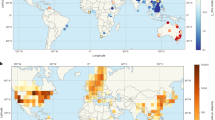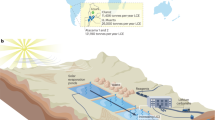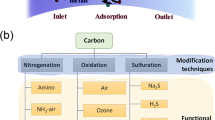Abstract
SYSTEMATIC knowledge of the abundance of trace elements in marine organisms is far from complete. Most currently accepted values have been determined by spectroscopy or flame photometry but for a number of elements these methods leave much to be desired. The method of activation analysis not only increases the sensitivity for many trace elements1 but also eliminates the necessity for running ‘blank’ analyses on the reagents since small amounts of impurities contained in the reagents will not be measured.
This is a preview of subscription content, access via your institution
Access options
Subscribe to this journal
Receive 51 print issues and online access
$199.00 per year
only $3.90 per issue
Buy this article
- Purchase on Springer Link
- Instant access to full article PDF
Prices may be subject to local taxes which are calculated during checkout
Similar content being viewed by others
References
Fukai, R., and Meinke, W. W., Limnology and Oceanography, October, 1959 (in the press).
Meinke, W. W., Nucleonics (July, 1959, in the press).
Strominger, D., Hollander, J. M., Seaborg, G. T., Rev. Mod. Phys., 30, 585 (1958).
Hughes, D. J., Harvey, J. A., U.S. Atomic Energy Commission Rept. BNL–325 (July, 1955).
Author information
Authors and Affiliations
Rights and permissions
About this article
Cite this article
FUKAI, R., MEINKE, W. Some Activation Analyses of Six Trace Elements in Marine Biological Ashes. Nature 184, 815–816 (1959). https://doi.org/10.1038/184815a0
Issue Date:
DOI: https://doi.org/10.1038/184815a0
This article is cited by
-
High rhenium enrichment in brown algae: a biological sink of rhenium in the sea?
Hydrobiologia (1991)
-
Neutron activation analysis without multielement standards
Journal of Radioanalytical and Nuclear Chemistry Articles (1987)
-
Epithermal neutron activation analysis using the monostandard method
Journal of Radioanalytical and Nuclear Chemistry Articles (1987)
-
The radioanalytical bibliography of USA (1936–1977)
Journal of Radioanalytical Chemistry (1981)
-
Determination of vanadium in biological materials at nanogram level by neutron activation analysis
Journal of Radioanalytical Chemistry (1978)
Comments
By submitting a comment you agree to abide by our Terms and Community Guidelines. If you find something abusive or that does not comply with our terms or guidelines please flag it as inappropriate.



